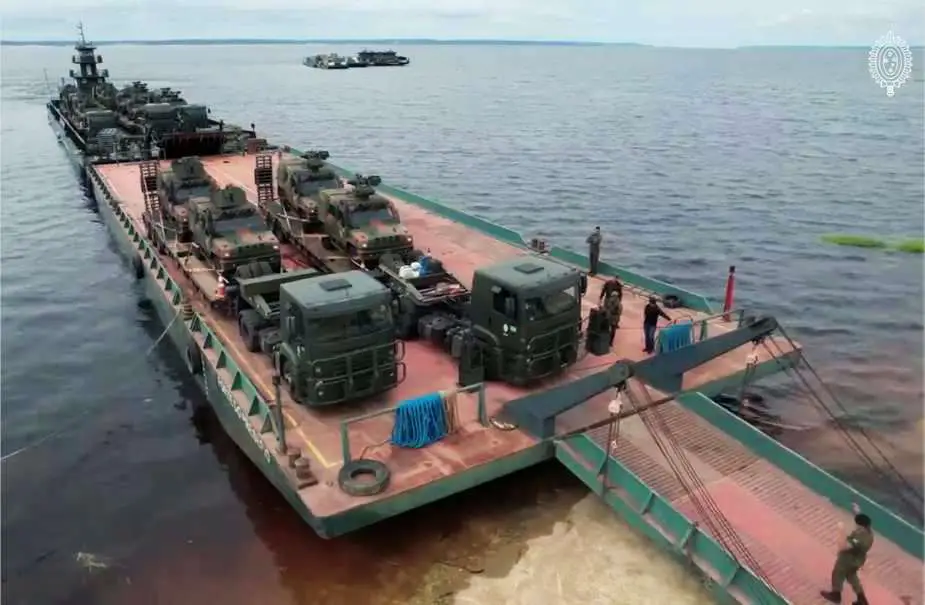Breaking news
Brazil reinforces military presence amid rising tensions with Venezuela.
As reported by the Brazilian Army on January 18, 2024, the Amazon Military Command (CMA) received a convoy of military material comprising 81 vehicles, which included 14 Guaicuru 4x4 multitasking armored vehicles, 6 VBTP-MR Guarani 6x6 armored personnel carriers (APCs), 6 EE-9 Cascavel 6x6 reconnaissance vehicles, and Command and Control modules.
Follow Army Recognition on Google News at this link

The Amazon Military Command (CMA) received a convoy of military material comprising 81 vehicles, and the transportation of this equipment covered a distance of over 2,100 km. (Picture source: Brazil Army)
The transportation of this equipment covered a distance of over 2,100 kilometers, starting from Campo Grande and concluding in Porto Velho, with further river transport to Manaus. This delivery is part of Operation Roraima, aimed at enhancing the operational and logistical readiness of the CMA Readiness Force, specifically the 1st Jungle Infantry Brigade (1st Bda Inf Sl).
The deployment, initiated on January 13 by the 4th Mechanized Cavalry Brigade, involved the transportation of 85 vehicles and over 200 soldiers. The resources were initially gathered at the 20th Armored Cavalry Regiment in Campo Grande before operational preparations commenced. These vehicles, sourced from various military units, converged in Campo Grande under the coordination of the Logistics Command. They underwent preventive maintenance by the 9th Maintenance Battalion to ensure operational readiness for the 2,100-kilometer journey to Roraima.
According to available information, the first deployed unit consisted of 50 personnel, 14 Iveco LMV-BR Guaicurus 4×4 wheeled armored vehicles, and 18 vehicles with various specifications. These units departed on January 13 from the Regimiento de Caballería Blindada N°20, based in Campo Grande, escorted by the 9th Army Police Battalion. Additionally, as per images shared by the Brazilian Army, several EE-9 Cascavel vehicles were also part of the deployment.
The equipment was planned to arrive in Porto Velho on January 18, from where it would be transported to Manaus by river, with an estimated eight-day journey under the coordination of the Boats Center of the Military Command of the Amazon. Subsequently, the vehicles would be transported to Boa Vista, where they would join the 18º Regimiento de Caballería Mecanizada.
Previously, as reported by Army Recognition on December 21, 2023, the Brazilian Army advanced the deployment schedule for the MSS 1.2 AC anti-tank missile, originally slated for 2024, before the final report on equipment tests was concluded. This decision coincided with the reorganization of the Boa Vista cavalry squadron into the 18th Mechanized Cavalry Regiment (18th RCMec) and can be considered as a strategic move aimed at strengthening the defense capabilities of the state of Roraima, particularly in response to potential threats, including the presence of 92 T-72B1 tanks within the Venezuelan army, addressing identified gaps in the region's existing defense framework.
The Brazilian Army is increasing its presence along its northern border in response to ongoing tensions between Venezuela and Guyana concerning the Esequibo region. This disputed territory, known for its environmental and agricultural significance, has been a source of contention between the two nations, with Venezuela laying claim to nearly two-thirds of Guyana, particularly heightened by the discovery of substantial oil reserves in 2015.
Venezuelan President Nicolás Maduro framed the territorial dispute as a historical matter and organized a controversial referendum on December 3, 2023, which favored Venezuela's territorial claim over the region. This referendum faced international criticism for its perceived breach of previous international agreements and raised concerns among Guyanese residents about potential Venezuelan annexation, impacting local activities such as school attendance and raising doubts about Guyana's preparedness for potential conflicts.
Despite the International Court of Justice's (ICJ) directive to Venezuela to abstain from any actions that could alter the status quo of the disputed territory, President Maduro has proceeded with both military and administrative initiatives to integrate Essequibo into Venezuela. In response, Guyana's President Mohamed Irfaan Ali has committed to strengthening protective measures for Guyana's territorial integrity, while Maduro has ordered Venezuelan state-owned companies to commence exploration activities in the disputed region, further heightening tensions in the area.


























